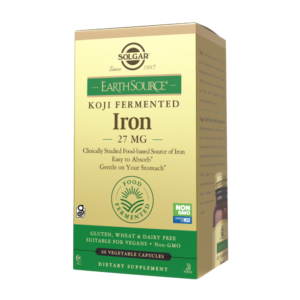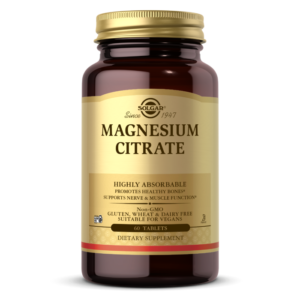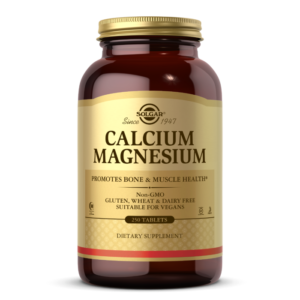Key Takeaways:
- While vitamins are organic substances, minerals are inorganic substances that your body cannot naturally produce. Therefore, both major and trace minerals must be consumed through a well-balanced diet, or supplements.
- Iron, calcium, magnesium, and zinc are four minerals that are essential for maintaining good health.
What’s the difference between vitamins and minerals? Why do we need them – and which ones do we need? We’re here to answer all your questions about some of the body’s most important nutrients.
What are minerals?
The difference between vitamins and minerals is that vitamins are organic substances, meaning they are made by plants or animals. Many vitamins are considered essential to humans, meaning we cannot synthesize these vitamins in sufficient quantities ourselves. Minerals, on the other hand, are inorganic substances found in soil and water, and absorbed by plants or eaten by animals. It is important to know that our bodies cannot naturally produce minerals, so we must rely on a healthy and well-balanced diet to provide these body-nourishing nutrients.
Major vs trace minerals
Based on daily dietary requirements, minerals can be divided into two categories: major (or macrominerals) and trace (or microminerals). Major minerals include calcium, phosphorus, potassium, and magnesium. They are considered major minerals because the estimated dietary need for them is 100 milligrams or more per day. Trace minerals include iron, zinc, iodine, chromium, and selenium. The estimated dietary need for these is less than 100 milligrams per day.
What does “chelated minerals” mean?
“Chelation” of minerals simply refers to a mineral being organically bonded to an amino acid. In nature and in our food, all minerals are chelated. These amino acid chelates are readily absorbed during the digestion process.
This is why Solgar® offers a variety of mineral products in chelated form, such as calcium, magnesium, iron, zinc, copper, manganese, and molybdenum. It’s better, smarter nutrition in a way that nature intended.
Why do we need minerals?
Minerals are an essential part of a healthy diet. Minerals support growth and development and ensure our bodies function optimally.* Minerals are necessary to support healthy bones and teeth, help transmit information along nerves, help determine the balance of fluids in our body, and in some cases help the body to make hormones.*
Most U.S adults are not getting sufficient amounts of essential nutrients from a balanced diet.1 That’s why, for many people, mineral supplementation may be beneficial for closing the nutritional gap.
Let’s take a look at four important minerals to include in your diet or supplements.
1. Iron
Iron is present mostly in animal protein like lean meats and seafood, but also in nuts, tofu and white beans in smaller amounts. Iron helps make hemoglobin, the crimson pigment in red blood cells that helps carry oxygen around the body.
Iron is also important for energy utilization.* Athletes may need more iron to support oxygen transport to working muscles and to make up for elevated iron losses during exercise.*
According to the CDC, the prevalence of iron deficiency and iron deficiency anemia among U.S. adults is estimated to be 14% to 20% in women and about 3% in men. Iron supplementation may be important for individuals who follow plant-based diets and menstruating women as both groups may be more vulnerable to iron deficiency.
According to the 2015 Dietary Guidelines for Americans, adolescent girls and women ages 19 to 50 years/of childbearing age do not get an adequate amount of iron. For this reason, low intake of iron is considered a public health concern for young children, women capable of becoming pregnant, or women who are pregnant.
Solgar® Gentle Iron Vegetable Capsules are gentle on the stomach, and are a great option for those who are at risk of an iron deficiency.* They are also gluten, wheat, and dairy-free, and are suitable for vegans.*
Solgar®’s Earth Source Food Fermented Koji Iron supplement is a unique, slower-release△ form of iron. Strongly tied to Japanese culture for more than 2,000 years, Koji has long been used in the production of vinegar, soy sauce and miso. Koji, a Japanese term for “cultured grain,” is derived from a starter culture grown on rice. As the Koji matures and ferments, iron is introduced to the mix and becomes naturally stored within the cells of the Koji culture. It is later harvested to provide a gentle, enriched source of iron.*
△As seen in one unpublished study (n=16) compared to the most commonly used supplemental source of elemental iron.
2. Calcium
Calcium is found in dairy products, fish with edible bones, and leafy green vegetables like broccoli and kale. It is the most abundant mineral in the body, representing between 1.5-2% of total body weight, stored mainly in bones and teeth. Along with being needed for healthy and strong bones, calcium ensures muscles and nerves work properly too.* When
combined with a healthy diet and physical activity, adequate calcium and vitamin D throughout life may reduce the risk of osteoporosis.*
Supporting healthy bones starts in childhood and adolescence. Getting enough calcium when we are younger leads to a more well-developed bone structure as we get older, and continuous intake is necessary for maintenance as we age.
You will often find magnesium added to calcium supplements. This is because magnesium helps to regulate calcium transport and stimulates the secretion of calcitonin, a hormone that aids in the influx of calcium into bone.
Solgar® Liquid Calcium Magnesium Citrate with Vitamin D3 provides 600 mg of calcium, 300 mg of magnesium, and 12.5mcg (500 IU) of vitamin D3 per serving. Vitamin D3 is also added to assist with calcium absorption.* This supplement provides the important benefits of calcium in an easy-to-absorb liquid form, and is available in three delicious flavors.
3. Magnesium
Magnesium is found in green leafy vegetables, avocados, raspberries, and in nuts and seeds. Magnesium is essential for bone mineralization, helps muscle contraction and relaxation, and supports energy metabolism in the body – perfect for athletes and for unwinding after a busy day.*
Magnesium is a heart-healthy mineral too – helping to support a normal heart rhythm.* Magnesium also plays a vital regulatory role in the central nervous system and supporting nerve cell function.* Recent studies on magnesium supplementation have also shown that it can help with occasional anxiety and support a calm, relaxed mood.*
Despite being the fourth most abundant mineral in the body, some studies suggest that up to 75% of US adults may be getting less than they need every day. Supplements such as Solgar® Magnesium Citrate Tablets can help meet any dietary gaps, by providing multiple forms of magnesium and calcium in a 2:1 magnesium to calcium ratio.*
4. Zinc
While being a trace mineral, zinc is found in all of the body’s organs and tissues. It’s also involved as a component of more than 300 enzyme systems, which is more than all other trace minerals combined. It’s essential for the formation of DNA, the synthesis of collagen in bone tissue, immune function, and reproductive and sexual health.*
Zinc is found mainly in red meats, poultry and dairy products, and seafood – especially oysters and mollusks. These animal products represent the majority of the dietary intake of most U.S. adults; however, some populations such as the elderly and vegetarians may not consume sufficient amounts to meet recommendations.
In this case, zinc supplements, such as Solgar® Chelated Zinc Tablets, are excellent supplementations to add to a healthy diet.*
GET THE LATEST UPDATES AND EXCLUSIVE DEALS WHEN YOU SIGN UP FOR OUR NEWSLETTER!
Summing it up
The body cannot naturally produce minerals, so relying on a well-balanced diet or supplements is necessary to receive the daily mineral requirement. Major and trace minerals are both needed to maintain good health, and while they can be found in various foods, supplements are also a great way to fill any nutritional gaps.
For more tiny tips about health and wellness, be sure to follow us on Instagram! @solgar.
*These statements have not been evaluated by the Food and Drug Administration. These products are not intended to diagnose, treat, cure or prevent any disease.
The information provided on this site is intended for your general knowledge only and is not a substitute for professional medical advice or treatment for specific medical conditions. Always seek the advice of your physician or other qualified healthcare provider with any questions you may have regarding a medical condition. The information on this website is not intended to diagnose, treat, cure or prevent any disease. Never disregard medical advice or delay in seeking it because of something you have read on the Solgar® site.
References:
1 Lee-Kwan SH, Moore L V., Blanck HM, Harris DM, Galuska D. Disparities in State-Specific Adult Fruit and Vegetable Consumption — United States, 2015. MMWR Morb Mortal Wkly Rep. 2017;66(45):1241-1247. doi:10.15585/mmwr.mm6645a1





